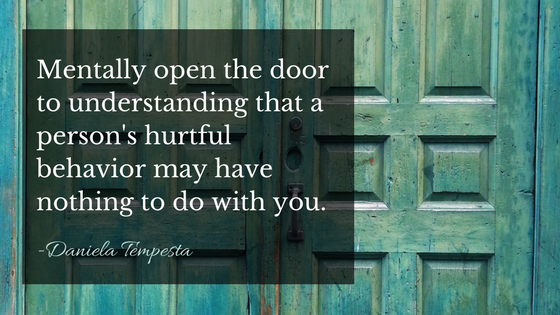How often do you get upset because of something someone else has said or done?
For most of us, the answer would be more often than we’d like.

We may become anxious, sad, angry, resentful, or insecure because of someone else’s words or actions, or even their silence and inaction. However, the problem is often not other people’s behaviors but that we are allowing others to define how we feel.
Victor Frankl, noted psychiatrist and Holocaust survivor, said that “between stimulus and response, there is a space. In that space is our power to choose our response. In our response lies our growth and our freedom.”
Here are six ways you can you can keep others’ actions from stealing your joy and peace:
1) Consider the source and be compassionate.
When someone is being critical, cruel, or just generally jerky, it’s possible this person is projecting their own unhappiness onto you. Before drowning in self-doubt or getting angry, try having compassion for that person’s suffering. Think to yourself, “I’m sorry this person is struggling so much that they need to lash out like this.” This does not mean that you are condoning bad behavior, but rather you are choosing to feel compassion for another’s suffering instead of personalizing their pain.
2) Focus on what you can control.
You may not be able to control what other people say or do, but as Frankl says, you can control your reaction to it. Focus your energy on the things you do have the power to change. If you find yourself rattled by someone, try one of these quick mood-shifting tips:
- Take 10 deep breaths.
- Hold a smile for 60 seconds.
- Redirect your attention to something that is meaningful to you and aligned with your values.
Also, practice noticing your thoughts as an observer without getting entangled in them. This allows you to create some space from the thought and be better equipped to evaluate its validity.
3) Ask yourself: What are the other possibilities?
Frequently the way someone is behaving has nothing to do with you. Ask yourself what else could possibly explain the other person’s words, behaviors, or actions. Is he having a bad day? Is she incredibly busy and can’t come up for air? Is there a family problem? Doing this mentally opens the door to understanding that the hurtful behavior may have nothing to do with you.
4) Be mindful of the technology bias.
These days we are much more likely to communicate via text, email, or chat than on the phone or in person. Tone is incredibly hard to read in these contexts. Have you ever said something sarcastically via text but the person did not realize it because they could not hear the inflection in your voice when you said it? Before jumping to conclusions, ask yourself if some meaning may have been lost in cyberspace.
5) Override the brain’s negativity bias by collecting good things.
Unfortunately, our brains are hardwired to focus on the negative. But we can counter this bias by purposefully directing our attention towards focusing on good. When you have a positive experience with someone, let yourself savor it instead of immediately moving along to the next thing. Keep a list of your personal strengths in your phone. Create a special folder in your email to fill with loving and positive emails people send you. When you are feeling hurt by someone else’s words or actions, refer back to these things to remind yourself just how wonderful you are. Arming yourself with positivity makes it harder for your mind to run with a negative hypothesis.
6) Ground yourself each day with meditation.
Start your day with a short meditation to get yourself grounded. One of meditation’s proven benefits is increased emotional equanimity — the ability to respond, instead of reacting.
Take a compassionate moment to reflect and commit to:
- Believing in yourself and your worth
- Finding the balance between “stimulus and response”
- Granting the same compassion you give to others to yourself
- Having gratitude for all the good in you and your life
This grounding process will help you feel calm and confident as you move through the rest of your day.
The next time someone offends you with their words or actions, try one of these strategies to assist you in letting go and not taking it personally.



